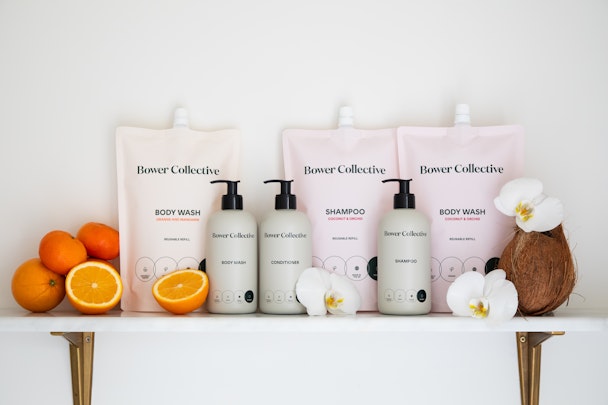Sustainable brands won’t thrive until we hold FMCG greenwashers to account
Bower Collective’s Nick Torday reveals how like-minded brands can learn from the daily struggles of his sustainable consumer goods company this Earth Day.

As a sustainable consumer startup, we are in a constant battle with the big FMCG brands to make a persuasive argument to consumers about the genuine environmental benefits of our products versus theirs.
Let me give you an example.
Dove, the Unilever behemoth (over $6bn revenues in 2023), makes bold and unsubstantiated claims that it is “leading the fight against plastic waste.”
In reality, Greenpeace awarded it the ‘Greenwasher of the Year’ accolade this year. The body claims Dove is dumping 12,000 highly polluting plastic sachets on low-income communities around the world every minute - that’s over 53bn single-use sachets in 2023 alone.
In December 2023, the Competition and Markets Authority (CMA) began an investigation into parent company Unilever under the Green Claims Code - finally holding it to account for vague and spurious claims, with the CEO of the CMA saying, “We’ll be drilling down into these claims to see if they measure up. If we find they’re greenwashing, we’ll take action to make sure shoppers are protected.”
Unilever claims to want a ‘waste-free’ world, yet just 0.2% of its packaging is reusable. Unilever claims it increased its use of recycled plastic to 22% of its total plastic footprint. And under its definitions, “53% of its packaging is recyclable, reusable or compostable”. Were that true, would it be enough?
Unilever, P&G and others wield enormous influence and have dominant market share across most categories.
Meanwhile, our mission is to eliminate waste and reduce carbon emissions from the consumer goods industry. I cannot stress how difficult that is when one of our packs (reusable circular packaging, zero waste, low carbon intensity) is sat on a supermarket shelf next to a Dove ‘Refill’ pack with a huge claim saying 65% LESS PLASTIC.
Well, guess what, kids? That’s still 100% plastic waste.
This challenge presents itself across all marketing channels - digital, DM, in-store.
With significantly less cash to throw at through-the-line marketing, we need to fight even harder to win out. Some of our most successful and high-performing content on the main ad platforms is in the “Us v Them” context where we make credible and evidenced comparative claims between our product and the big brand (toxic and waste-intense) alternative.
A couple of months ago, this resulted in a cease and desist letter from another major multinational personal care brand - we have neither the cash nor the operational bandwidth to fight these. These brands have in-house counsel on payroll. So - in most (not all) cases, we have to back down.
Before we crank up the tiny violins, there is nothing new to this narrative - disruptor brands have long had to fight against the might of established, planet-unfriendly incumbents - look at the flak that the EV industry has had to endure over the years from the automotive lobby.
The latest point of interest is the dairy lobby undermining the alternative milk leaders with alarmist claims about their negative environmental consequences (which obviously pail in comparison to the dairy industry, if you’ll pardon the pun).
How can you beat the greenwashers?
Here’s a few pointers:
-
Make sure your claims are credible and evinced. For instance, we make a key claim around our bestselling Limescale Remover that it is 2x as effective as Viakal - this is validated by an independent lab test that we conducted with a third party.
-
Focus on the delta between your product and the supermarket/conventional alternative - for instance, our BowerPack™ reusable packaging is up to 77% more carbon efficient than single-use packaging, again evidenced by an external LifeCycle Assessment.
-
Go hard at the opposition when they are making bogus claims - report them to the ASA (Advertising Standards Authority) as a consumer - not a company as they will just insist you “you must first raise your concerns with the competitor directly and attempt to resolve the issue” - and good luck with that!
Ultimately, building any brand to stand up against the global category leaders is hard graft - but we should not, and will not, accept that they can leverage their scale and corporate influence to greenwash their way out of the massive environmental challenges facing our planet. This Earth Day, let’s make it our collective responsibility to hold them to account.
And if you want more tips on how we’re going to market, check out our collection here.

